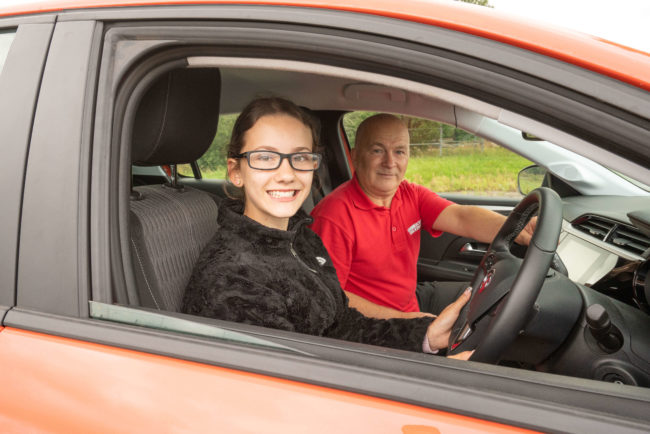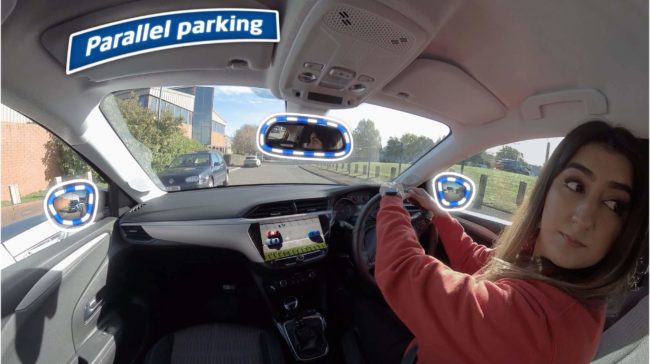Teenagers often look to dad for help when they learn to drive. Here’s how you can help them feel confident and capable behind the wheel:

Try an app

The Young Driver App takes learners from first lesson to driving test. Lessons are given via 360° videos which can be watched on a smartphone or VR headset. The videos, which are rotatable so they can be seen from every angle, are filmed with Approved Driving Instructors, with a voiceover written and narrated by driver’s champion Quentin Willson. The videos cover everything from tackling junctions and roundabouts to manoeuvres such as parking or reversing. This is alongside theory test practice modules, hazard perception videos and top tips – everything needed to complement in car tuition.
Practice makes perfect
‘Of course in car practice is the key, but if there’s a way to reinforce those skills at home using technology, it makes sense to do that,’ says Sue Waterfield, of Young Driver. ‘Parents can also help by taking youngsters out to practice – but our research shows that only a third of parents (33 per cent*) would feel confident teaching their child to drive, even alongside professional tuition.’
Advice to avoid arguments
Young Driver has worked with teen expert, Nicola Morgan, to pull together some advice to help parents cultivate their teenager’s confidence while they learn to drive:
1. Show you trust your child
Showing you trust them behind the wheel of your car is a confidence boost in its own right. Especially in a world where children are so often not allowed to take ‘risks’ because of safety concerns.
2. Offer genuine and specific praise
Saying “You did really well” when they didn’t will not help as they’ll see through it. Young people almost always need the approval of their significant adults, even if they may not say so! Pinpoint specific things they did well or any good questions they ask.
3. Praise effort not talent
You might think that saying “You’re really good at this” would be confidence-boosting but comparing them can create competition. The positive feeling wears off as they start to think they are good at it by luck – they lose ownership. Try complimenting their effort instead, “Well done – you listened really well/ worked really hard/ really got the hang of that”.
4. Speak to them like an adult
Although you don’t have to be all matey and fun and jokey! You know driving is serious and you want them to think it’s serious, too.
5. Listen to them when they express an emotion, fear or worry
Validate it, by explaining that you have experienced the same thing. Try and say things like: “Lots of people worry about that”, “I used to worry about that” or “It’s actually good that you’re nervous about that because it means you’ll concentrate”. Never dismiss it.
6. Emphasise that everyone has good and bad days
If they are tired or stressed encourage them to leave their worries at the door and treat the driving lesson as a positive, energising experience. Driving is an activity which occupies enough of their concentration that they cannot simultaneously be dwelling on whatever other worries they have.
7. Help them realise that struggling with something is still helping them learn
Praise them for keeping trying even when they were struggling. It all helps – in fact during overnight sleep, we improve the physical skills practised during the day.
8. Practice is key– even if it’s on the screen
There’s a theory that mirror neurons in our brain fire when we watch someone do something and that this may help us later perform that action ourselves. So, watching a driving instructor perform an action in a 360° video, such as on the Young Driver app, might well improve speed and efficacy of acquiring driving expertise.
About the Author
Young Driver is the UK’s largest provide of driving lessons for 10-17 year olds and has delivered over 900,000 lessons at 70 private venues across the UK. For more information go to www.youngdriver.com or to download the app search ‘Young Driver App’ on Google Play or the App Store.
Nicola Morgan is an internationally-acclaimed author and authority on teenage wellbeing often referred to as ‘The Teenage Brain Woman’. Her books include Blame My Brain, which was shortlisted for the Aventis Prize, the Teenage Guide to Stress, Teenage Guide to Friends, Positively Teenage, Life Online, Body Brilliant, The Awesome Power of Sleep and Be Resilient.
Want to talk to other dads? Join our friendly forum.







